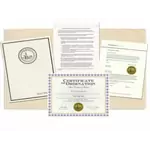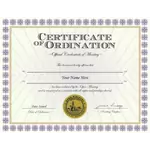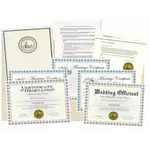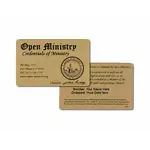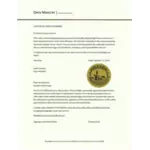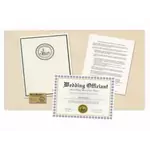State Marriage Laws and Information
Since 2010, Open Ministry has been ordaining and helping people all over the world perform weddings, ceremony and other sacerdotal duties. This page focuses on requirements and information for New Jersey; Scroll down to the bottom of the page for links to other states.
How to get ordained and perform a wedding in New Jersey
If you are planning to get ordained in New Jersey or you have been asked to perform a wedding ceremony in New Jersey, or simply need to to find an ordained minister in New Jersey to perform your wedding ceremony.
This ordination information forNew Jersey is provided below in an easy five step layout which is designed help walk you through the most common steps on registering to become a minister for New Jersey and how perform a wedding ceremony in New Jersey.
Step 1 - Get Ordained Online for free with Open Ministry
Step 1: Get Ordained in New Jersey with Open Ministry
Start your journey as an ordained minister in New Jersey with Open Ministry’s free, fully digital ordination process. Most applicants receive their confirmation email within 24 hours; printed hard copies are available for a nominal charge, so you’ll be ready to officiate ceremonies statewide!
When you get ordained in New Jersey through Open Ministry, you’ll enjoy:
- Free ordination - no fees, no delays.
- Emailed confirmation - arrive in minutes.
- Printed certificates available - visit our bookstore for details.
- Full officiation privileges - weddings, vow renewals, and more.
- Trusted since 2010 - join thousands across New Jersey.
How It Works
- Hit the Get Ordained in New Jersey link.
- Fill in your details on our secure form.
- Receive your digital confirmation by email; order printed certificates if you wish.
With your Open Ministry credentials, you’ll be a legally recognized minister in New Jersey, able to preside over wedding ceremonies anywhere in the state.
Begin Your New Jersey Ordination
100% free ordination online-printed certificates available for a small reasonable fee.
Step 2 - Contact The County Clerk
How to Register to Officiate a Marriage in New Jersey
Next, contact the office of your local marriage authority (typically your county clerk in New Jersey). Let them know that you are a ordained minister with Open Ministry in California, and ask them what information the will require of you, to officiate a marriage in New Jersey. Most clerks and governing agencies may require that you present them with a physical copy of your ordination record.
When speaking with the county clerk; it can be helpful to use the following phrases.
- What agency or department issues marriage licenses in your county and how may I contact them?
- I am an ordained minister with a church in California and I would like to register as a wedding Officiant in your county to perform and solemnize weddings.
- I have my Letter of Good Standing and/or Ordination Credential as proof of my ministry and ordination.
- What additional documentation is required for me to register as a wedding Officiant in your county or state?
Step 3 - Get registered to perform a Marriage
License to perform a wedding in New Jersey
After you've contacted your marriage authority, you will want to visit our bookstore to get physical copies official credentials for presentation and your records. (See New Jersey State Statutes for More Specific Requirements )
When registering in New Jersey you may be asked to display proof of your ordination to the county clerk's before they will accept the marriage license as having been legally solemnized. We typically advise ministers of New Jersey to get a Complete Minister Package for New Jersey which includes your Letter of Good Standing (the live signed and notarized physical copy of your standing with our ministry).
Having your physical copies credentials provides peace-of-mind to couples and others that you intend to marry. Additionally, we recommend at least 4 weeks between the date of the wedding ceremony and your order, to ensure that you receive all of your materials and are able to register in time. Please note that every state and county can impose different requirements. This may include other nominal fees and additional paperwork that may need to be completed before the ceremony can take place.
It is important to note that some county clerks in New Jersey may require wedding officiants to attach a statement which asserts some of the elements in the marriage license upon submission, including the following:
- The time and location at which the wedding took place
- The names and places of residence of all official witnesses
- The religious organization in which the officiant is ordained
- The printed name and address of the officiant
Please note that, when filling out a marriage license, that New Jersey State may request you use the title "Minister" or "Reverend". The County Clerks may also require you enter your denomination, you can use "Non-Denominational". Failing to state a denomination may result in rejection and could require a duplicate marriage license.
Step 4 - How to Perform the Wedding
How to perform a wedding in New Jersey
Once you have completed of the above, you are ready to perform the wedding! Be sure that the couple has picked up their New Jersey state issued marriage license from the appropriate office. New Jersey marriage licenses valid for a set number of days, and there may be a waiting period between when the couple receives the marriage license in New Jersey and when the ceremony may be legally performed in New Jersey. This information should be written on the license and followed to ensure the ceremony is recorded properly.
Please be aware that the signed license must be returned to the issuing office in New Jersey before the time limit is reached. Check the marriage license for the exact dates. Once the the previous matters have been addressed, officiating a wedding in New Jersey can be a great and wonderful experience.
If you have any comments or issues as a wedding officiant in New Jersey, or after you have been ordained, or would like to just asking for guidance on how to perform a wedding ceremony in New Jersey. We recommend that all new New Jersey wedding ministers who have issues or concerns about the ceremony read over our helpful guides.
New Jersey
37:1-13 Authorization to solemnize marriages and civil unions
Each judge of the United States Court of Appeals for the Third Circuit, each judge of a federal district court, United States magistrate, judge of a municipal court, judge of the Superior Court, judge of a tax court, retired judge of the Superior Court or Tax Court, or judge of the Superior Court or Tax Court, the former County Court, the former County Juvenile and Domestic Relations Court, or the former County District Court who has resigned in good standing, surrogate of any county, county clerk and any mayor or the deputy mayor when authorized by the mayor, or chairman of any township committee or village president of this State, and every minister of every religion, are hereby authorized to solemnize marriages or civil unions between such persons as may lawfully enter into the matrimonial relation or civil union; and every religious society, institution or organization in this State may join together in marriage or civil union such persons according to the rules and customs of the society, institution or organization.
Title 37: Marriages and Married Persons
Amended 1948, c.334, s.1; 1949, c.7, s.1; 1953, c.34, s.3; 1964, c.68; 1965, c.36; 1976, c.36; 1979, c.38; 1979, c.93; 1979, c.166, s.1; 1983, c.159; 1983, c.503; 1989, c.111; 1991, c.404; 1993, c.126; 1993, c.324; 1998, c.24; 2001, c.143; 2006, c.103, s.17.

